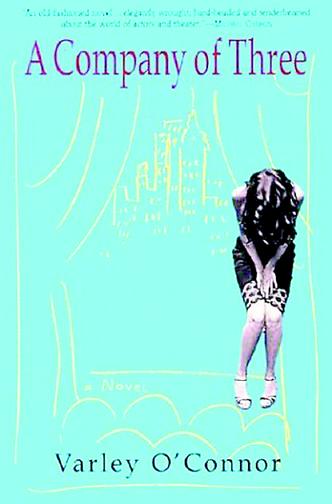Those of us who love theater understand what a play can offer that other art forms can't. Theater involves acting that's more spontaneous, more honest and more dangerous than you'll ever find on film or TV. Theater is live without a net, a 2,500-year-old art form that is still—even now, in the 21st century—central to our cultural identity.
Theater lovers will almost certainly be entertained by Varley O'Connor's new novel A Company of Three. Even if you don't give a fig about theater, you might want to give this simple, straightforward book a whirl. There's a small but significant chance you'll be converted.
A pretty boy aspiring actor named Robert befriends a homosexual six-foot-seven aspiring actor named Patrick during a prestigious acting workshop in Manhattan. One day a wispy transplant from Kansas named Irene—a former rodeo star and also, obviously, an aspiring actor—shows up for class. The tortuous life of up-and-coming thespians in the Big Apple in the late '70s soon binds these three together, and they become very intimate friends.
It isn't an easy relationship, mainly because these somewhat unstable performers save most of their drama for off stage. Patrick, an ex-dancer, suffers from chronic depression and a lack of confidence. He also seems to be a pathological liar. Irene, who tries to sleep her way to success, has some severe emotional problems of her own. Robert, who narrates the book, is the sanest of the bunch, but even he wrestles with some thorny Oedipal issues.
The three performers move in together and dream of starting their own theater. It never quite works out. Robert is the first to achieve some financial success, first in TV commercials, then as a soap opera star. This, predictably, causes an enormous amount of friction with the remaining two.
O'Connor—who like her protagonist has performed on stage, on TV shows and in commercials—knows how to communicate the joys of acting and theater to the uninitiated. In A Company of Three, she's crafted a very linear yet enjoyable story.
Even so, the book isn't perfect. Occasionally, her prose is stilted and clichéd. And I could never completely shake the impression that the character of Robert was a talented female writer's fantasy of what a heterosexual male is like. These are small complaints, though. Generally, A Company of Three is a finely plotted, engaging novel revolving around the friendship of three talented, strong-willed actors struggling to succeed in a very hostile environment.









